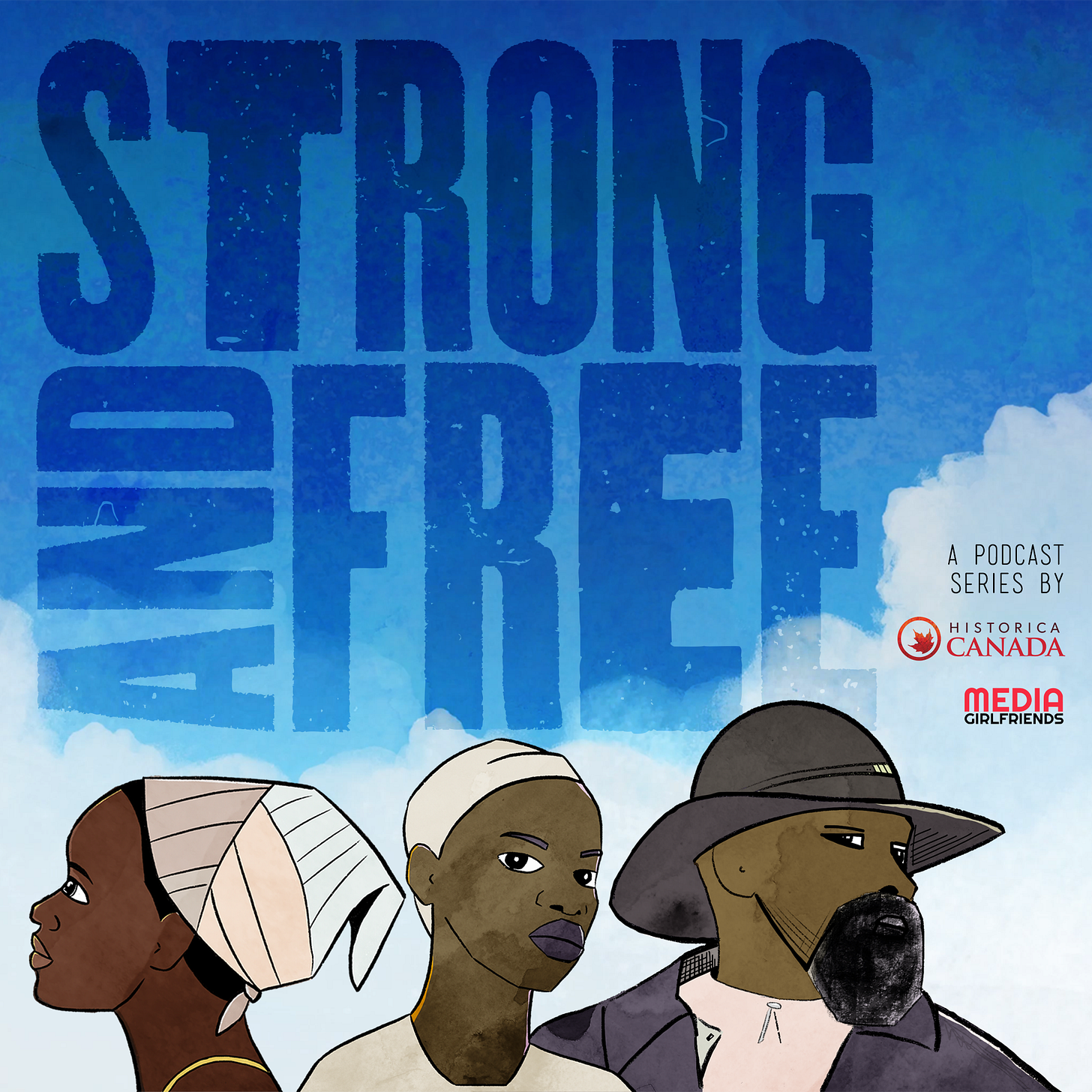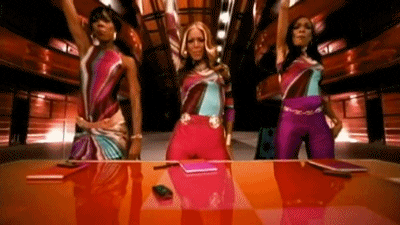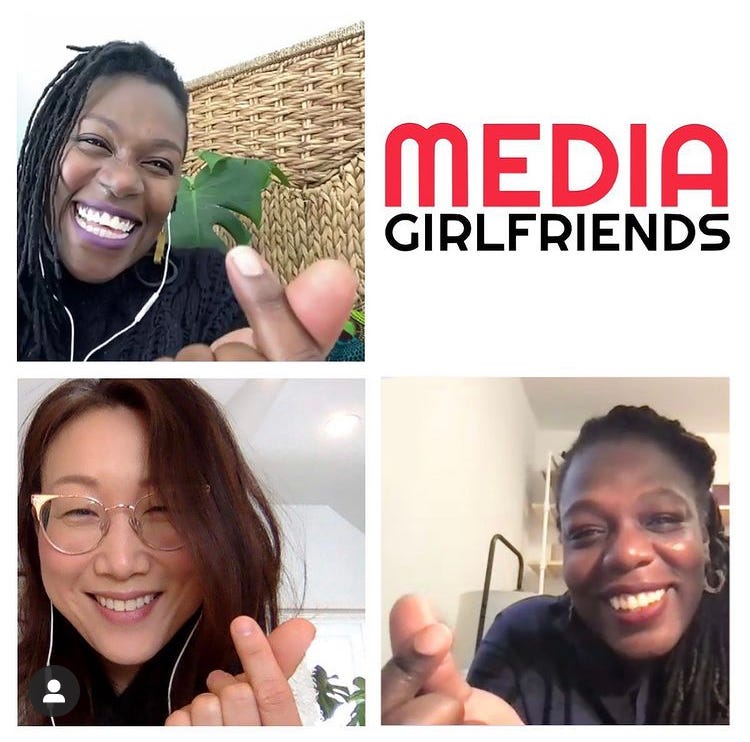Why I started a company during a pandemic
Welcome to At The End Of the Day. I’m Hannah Sung and I write this newsletter for a people-first perspective on the news. This month, I’m focusing on how we work. Subscribe and pay-what-you-wish to support this newsletter.
📣 Just published! Listen and subscribe 📣
Historica Canada and Media Girlfriends launched the trailer for our brand new podcast, “Strong and Free” (“Fort Et Libre,” in French): Because Black history is Canadian history. Follow on Spotify now or anywhere you get your podcasts starting Oct 5.
It all began with my personal board of directors
Before I tell you about starting a company during a pandemic, I have to tell you about my personal board of directors. I have a small group of girlfriends who are so into this idea that I thought we made it up (I Googled it — we didn’t).1
A personal board of directors are a trusted group of people who can help you navigate your work life. They’re invested in the business — the business of being you.
In my case, my personal board came together because we’re women in journalism who didn’t always get the support we needed at work so we gave it to each other.
At work, I was often the only woman of colour in the room, highly aware of when I’m being tokenized, often losing the battle with the sinkhole traps of diversity committees.2
My friends, in various locations around the city, were going through similar things. Coming together in our group chat meant we didn’t need to feel isolated at work.
We could commiserate, celebrate, discuss the industry, work out our ideas, and do it all with a ton of affection and trust. We cared about each other as humans, not just for our work output. And no matter what, we always found ways to laugh. Memes help.
Of course, it was a fun place to be precisely because we weren’t technically working together. There was no hierarchy. There was no pressure to perform. We were just trying to stick to our values and bolster each other to radiate these values in our work environments.
But then we started to think, What if we could just work in our own environment? One we made for ourselves? It was a teeny spark of an idea when...
The pandemic struck. The world closed down.
George Floyd was killed by police. And people flooded the streets.
Amidst this grief, a door opened.
Media Girlfriends, Inc
In August of 2020, a few friends and I got on a phone call. My friend Tori wanted us to know about a call-out for a podcast production company to create a new show, featuring stories of Black history in Canada.
A few things to mention here:
There were four of us on the call. We all have families and financial responsibilities. Two of us were already in full-time work and two of us, including myself, were working independently as podcast producers.
The request for proposals was for a Black history podcast. I told my friends that I felt strongly that Black creative people should be doing the storytelling work and suggested that I not take part. It can be an awkward topic, especially in the larger context of an industry so white. But in the context of our phone call, it was quick, open and decisive because we are friends who already discuss these issues. It wasn’t the end of the conversation on who should tell stories and how — for us, that conversation is ongoing.
This was a summer when so much of our world was in flux. And if you’ve been following ATEOD since last spring, you know that I’ve personally struggled with how to contribute meaningfully to the world, in ways big and small, in the context of the pandemic and ongoing racial reckoning.
To make a long story short, we didn’t start a company with a brilliant, unique stroke of genius and then bootstrap it or dazzle investors to land a giant chunk of change. That’s not our narrative.
Our company, in a way, already existed.
Our relationships already existed. Our values were there. We already had a personal board of directors.
And now, three out of the four of us on that original call are co-founders of this beloved, little company of ours: Media Girlfriends, Inc.
Even the work of podcasting was already being done. I was making podcasts for a living. Same goes for another co-founder, my dear friend Garvia Bailey. In fact, Media Girlfriends literally began with a podcast that original founder, Nana aba Duncan, was making in her kitchen back in 2016.3
We just needed to shine our energy in one direction. Creating a company together felt like a very grown-up thing to do (lawyers, shareholders agreements, contracts, everything but a wedding dress and ring!).
And now, a year since its inception, we’re finally able to share some of the work we’ve done together. There’s a trailer for our new podcast, Strong and Free, which you can find when you get to the end of this newsletter.
By making this show, we began building our company.
Today, Garvia Bailey, my Media Girlfriends co-founder (and one of the first readers of this newsletter!) joins me in a conversation on why we are building our company now.
“Bet on yourself”
H: Let’s start by talking about why we started building a company during a pandemic.
G: I was transitioning out of a really difficult time with my former employer, just as the pandemic hit. I already knew that I did not want to work like that again. I did not want to be under the thumb of someone who has so much control over writing the narrative of who I am, how I do what I do, and what I get paid. So it was coincidental more than anything, that the pandemic and this business came together at the same time. It felt like the universe was saying, Now is your time to step out into the world.
H: How did you feel about that? Were you scared of the business aspect of it?
G: I was of the mind that, if we’re going to fail at this, then the world is messed up and I should just have a sheep farm. Like, if I am going to hook up with these two powerhouses and between the three of us, we don’t succeed, or at least make an incredibly productive go at it, then the world is upside-down and I’m going to start making my own clothes and raise sheep in the hills of Ireland.
I don’t know, did you feel afraid of the business part of it?
H: I had this cautious feeling. All the dreamy aspects of working with your friends are obvious, right? And I was trying to look for any problems that might arise so we could head them off at the pass.
I feel like the kinds of businesses that get written about are the ones where it’s a buzzy startup and then a few years later, you sell it for a zillion dollars. Whereas, my definition of my own ambition is like, What does my everyday look like? Do I look forward to that day and then at the end of the day, look back and feel good? That’s a kind of ambition that nobody ever talks about; people talk about milestones and there’s an assumption of endless growth. But for me, it’s like, No, I want a life that I love. And that includes enjoying the work as I do it.
Also, I was nervous about accounting. But the truth is, it’s possible to get that done, I guess?
G: Or you just make enough money to hire people to do it.
H: Yeah! And over time, I started to see how detail-oriented you are and that’s a good counterpoint to me because I can often stay “big picture” and move quickly. I don’t slow down easily and you pump the brakes for me.
G: I appreciate it because nothing would get done if you and Nana aba didn’t keep pushing. I’m like, Let me just think for a minute to write this, and you guys are already writing.
H: It’s a good balance. It took me time to see that. Even with friends there’s a risk because we were already building the company by the time we were learning this about each other. I remember laughing in the beginning, saying it feels like we’re getting married —
G: It’s like getting married, for sure! And you know, another reason why I started this is that I have a daughter who is going out into the world. I really believe in teaching by example. I wanted to give her an example of taking a chance on yourself. I wanted to be an example of how this could work. During a pandemic, when things are upside-down, you should still be betting on yourself.
H: My own kids are younger. When I think back to when they were socially-isolated and doing Zoom school, they were like, “No fair! You get to talk to your friends all day!” And I thought, Huh, true!
I also want to add that saying, “why I started a business,” doesn’t feel all-encompassing enough to describe this life change. Because it’s not just a business. No journalist goes into the work they do because they want to become rich. That’s not the goal. You have all these other goals that drive you.
The thing that tipped me over was thinking, How am I going to get my life’s work done in this phase? How am I going to get it done with the least amount of negativity and the maximum amount of positivity? And be better in the workplace?
G: Yeah. My dream is to build a company that, when people finish a project with us, they say, “I'm proud of what I did. And that was time well-spent in my life. I enjoyed the work, I enjoyed the people I worked with. It was hard, but we got it done. We're all still happy and talking to each other and proud.” You know? That's it. Like, how hard is that?
H: I think that’s actually not easy to do! Because if you blindly keep valuing productivity or the end product, it's very easy for things to go sideways, on a people level, at any point!
And when I look back at making Strong and Free, for example, I look back on working with a team of a dozen people who are new to each other, who still have never met in real life —
G: To this day!
H: And somehow, even with all the stressors of pandemic life, we enjoyed working together. Plus, the work itself wasn’t easy. There’s stress when you’re handling history that has been suppressed. And doing this in English and in French. So this is stressful work during a stressful time. And somehow, honestly, we all loved working together — us, our partners at Historica Canada, every individual we brought on to the Media Girlfriends team, everyone we interviewed.
G: I’m just so proud of that.
H: Over the years, we’ve talked a lot together about how we need to do the work of storytelling, journalism and collaboration better, and with more care. And working with you I really saw you demonstrate how you do that.
We talk about doing the work with care, but what does that really mean?
Aaand on that question, this newsletter is to be continued! Part Two of this conversation to come next week.
Thank you, Garvia for being in conversation with me today and always a big shout-out to the original Media Girlfriend, founder Nana aba Duncan.
Find At The End Of the Day on Instagram here.
Happy Friday and thank you for reading!
Hannah
✨✨✨ At The End Of the Day is edited by Laura Hensley ✨✨✨
Clockwise from top left: Nana aba Duncan, Garvia Bailey, Hannah Sung
Strong and Free podcast trailer

I’ve written one advice column 💁♀️ AMA!
Last week, I broke out my first advice column. I had so much fun writing it. If you have any questions on life, relationships, work, your pet turtle or hamster (I’ve got a couple of consultants at home who can ably cover this off), write to me anytime by hitting reply on this email.
Everyone Needs A Personal Board Of Directors, Forbes. Ours is probably more organic than this might suggest but I thought this was a nice quickie overview
Food Media Has A Tokenization Problem — So How Can We Create A More Equitable Future Together? Studio ATAO. Some great discussion and glossary of terms
Media Girlfriends podcast by Nana aba Duncan on Acast Canada
How can you support the growth of ATEOD?
✅ Become a Patreon supporter of At The End Of the Day! ✅
My big goal with this newsletter is to build out the resources for a small team. If you are a regular reader, become a pay-what-you-wish supporter. Thank you to everyone who is subscribed, reading, sharing and supporting this work.
🔴 joni x ATEOD 🔴
Don’t forget! Use ATEOD15 get get 15% off your next order or subscription of period supplies from joni. Find out why I love this company and how they’re different.





